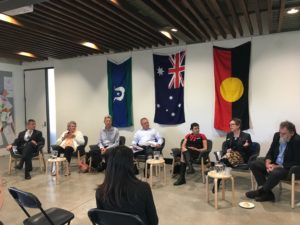
RAPs in the Region Panel, 2018. L to R: Gary Murphy (Lismore City Council), Aunty Irene (Bundjalung Elder), Anthony and Guy from Rous County Council, Edda Lampis From ACON, Annie McWilliam from Lismore City Council and Dr Norm Sheehan (Gnibi Wandarhn College of Indigenous Australian Peoples.
RAPs in the Region Event, Lismore NSW: Panel Discussion
National Reconciliation Week is held from 27th May to 3rd June every year. As part of Reconciliation Week events, Stefanie Stanley attended the ‘RAPs in the Region’ workshop hosted by Lismore City Council and Rous County Council today (May 31) at the Lismore Regional Gallery. Firstly, we thank Aunty Irene for Welcoming us to Bundjalung Land and sharing her experiences from Cubawee Reserve.
Stefanie says of the event, ” ‘RAPs in the Region’ is in it’s third year. It is a great opportunity for those wanting to develop a Reconciliation Action Plan to connect and learn from other organisations who already have RAP in place. In turn, it is also an opportunity for organisations who have a RAP to share their stories and assist those who are just starting out. The emphasis is very much on Action – not just creating a document that sits on a shelf .”
Gary Murphy, outgoing General Manager of Lismore City Council, highlighted that only 50 of the 500 local Councils in Australia have a Reconciliation Action Plan – this needs to change. We wholeheartedly agree.
Norm Sheehan from Gnibi Wandarhn College of Indigenous Australian People at Southern Cross Uni spoke about how the principles and ethics of reconciliation can help all people and spans across generations and cultures. Two of these basic principles being caring for each other and recognising each other as individuals – who have a right to be themselves & seeking to understand who we are ourselves.
Edda Lampis from ACON LGBTI, spoke about the challenges of developing a RAP statewide for ACON, how the systems and processes we have in place are colonialist and how we can challenge these ideas within our own organisations. Edda also challenged us to think about everyone’s own perceptions of the meaning of reconciliation.
Finally, Anthony and Guy from Rous County Council highlighted the start of their journey being the drought in 2003-4 and how the process of ‘going back to the beginning’ helped their organisation connect with the local Elders and look outward and communicate their messages from the heart.
Aunty Irene encouraged everyone to keep going and wished everyone the best, through many years and versions of the reconciliation process, she sees partnering with Reconciliation Australia as having real and meaningful change.
NRW 2018
The theme of National Reconciliation Week for 2018 is ‘Don’t Keep History a Mystery: Learn. Share. Grow’.
May 27 marks the date of the 1967 referendum altered the Australian Constitution in a momentous way, with more than 90 per cent of Australian voters choosing ‘Yes’ to count Aboriginal and Torres Strait Islander peoples in the census and give the Australian Government the power to make laws for Aboriginal and Torres Strait Islander peoples
June 3 marks the historic Mabo decision (1992) dispelling the myth of ‘terra nullius’ and recognising that there is overwhelming evidence of ancient and continuing Aboriginal and Torres Strait Islander agricultural, fishing and cultivation practices across the Australian continent.
We (Ecoteam) acknowledge and will never forget the negative aspects of Australian history and we seek to understand and celebrate Aboriginal culture and the long and enduring history and connection of Aboriginal peoples with their Country over tens of thousands of years. We intend to establish meaningful relationships with local organisations and identify ways we can understand and care for each other.
In celebration of Aboriginal people we acknowledge these significant achievements (only a few of many!!):
- Wiradjuri woman and tennis star Evonne Goolagong-Cawley (b. 1951) was ranked as the world number one in 1971 and 1976 alike. She has since started the Evonne Goolagong Foundation, which uses tennis as a meaningful platform for promoting education, health and wellbeing for future generations of Aboriginal and Torres Strait Islander young people.
- David Unaipon (1872 – 1967), a Ngarrindjeri man, was an inventor and innovator most commonly known for his modified design of the shearing shears. During experiments to attain perpetual motion, Unaipon discovered a way for the blades of the shearing handpiece to move in a straight line, which is the basis of modern shears today.
- In May 1868, a cricket team toured England comprised of 13 Aboriginal players, most of whom were Jardwadjali, Gunditjmara and Wotjobaluk men from the Western District of Victoria. These players represented Australia’s first-ever sporting team to tour internationally (10 years before the first non-Indigenous cricket team took to the global stage).
Developing Your RAP
Ecoteam are proud to support Reconciliation and lead the Lismore community in developing Reconciliation Action Plans (RAPs) alongside other organisations, including Lismore City Council, Rous County Council, Gnibi Wandarhn College of Indigenous Australian Peoples (Southern Cross University)(soon t have their RAP endorsed!) and ACON (soon to have their RAP endorsed!).
If you would like to know more about developing a RAP, please go to the Reconcilaition Australia website for a full list of resources. You can also contact Stefanie Stanley our Business Manager for more info on how we went about the process. To view the Ecoteam RAP, visit our Resources page.
Thanks to Reconciliation Australia website for providing the information for this blog post, we thank you for your ongoing leadership for reconciliation in this country.

